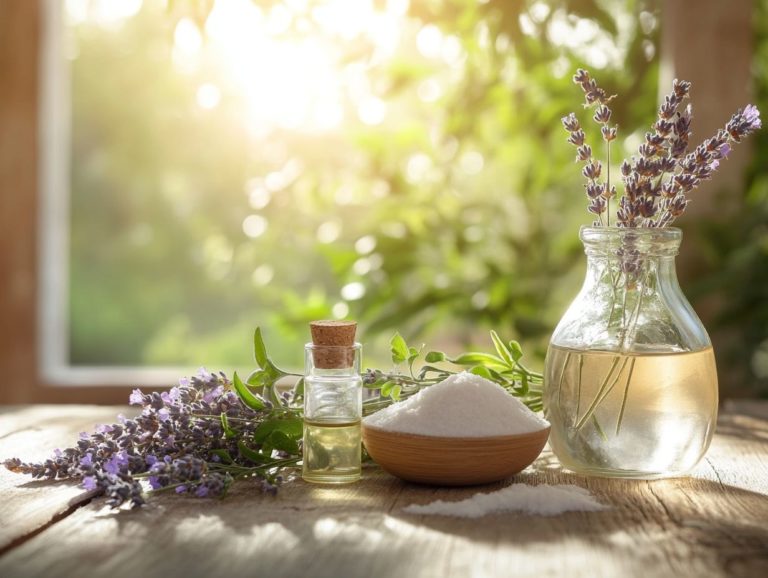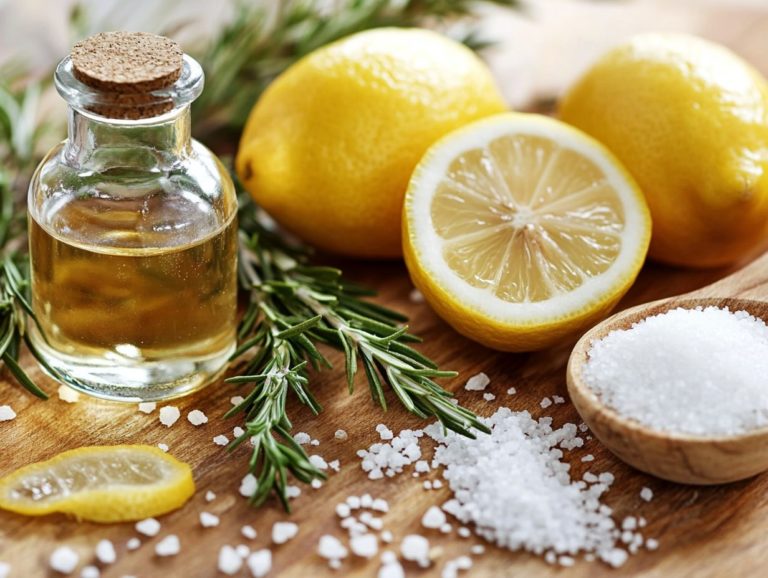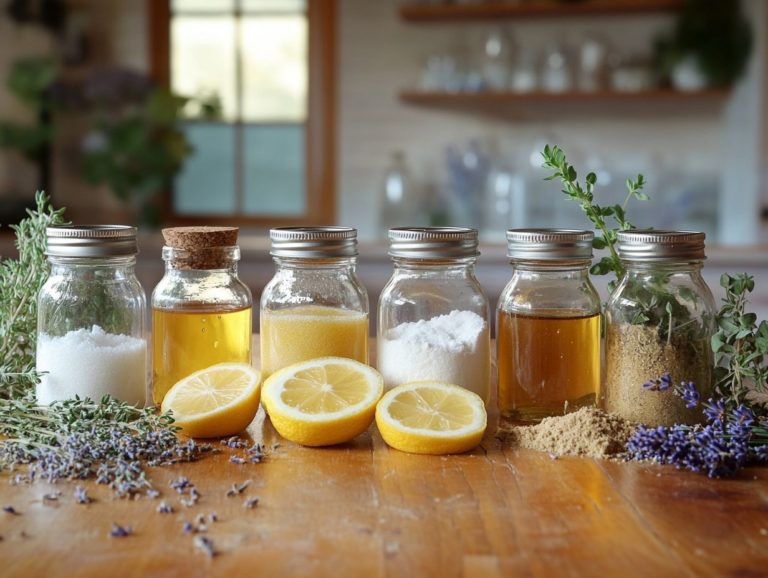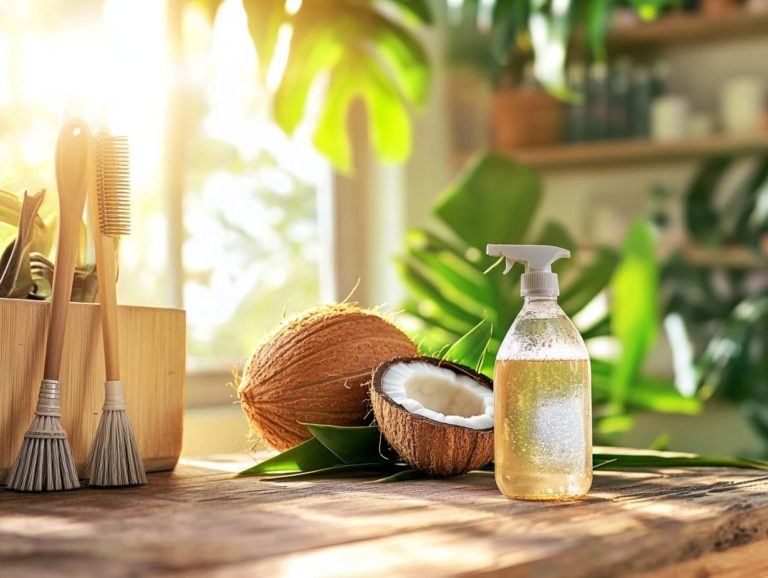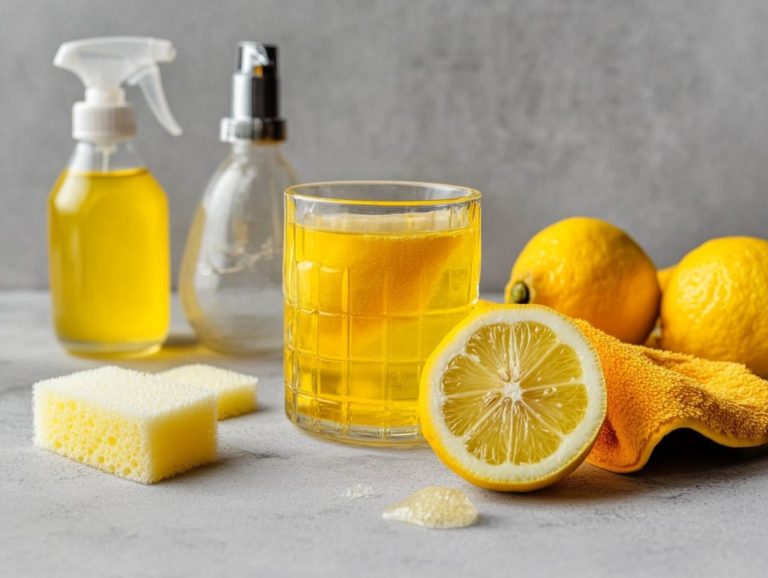The Benefits of Using Hydrogen Peroxide
Hydrogen peroxide is a remarkably versatile compound, offering an extensive array of applications that span from household cleaning to personal care, including its role as a disinfecting solution for wounds.
Hydrogen peroxide is renowned for its powerful disinfecting properties. It effectively eliminates germs, acts as a teeth whitener, and provides relief for minor wounds. However, while this compound presents numerous benefits, it s essential for you to grasp its potential side effects and understand the proper usage to ensure your safety.
Discover how this simple solution can fulfill multiple roles in your daily life while prioritizing your health and safety.
Contents
- Key Takeaways:
- What is Hydrogen Peroxide?
- How is Hydrogen Peroxide Used?
- What are the Benefits of Using Hydrogen Peroxide?
- Are There Any Side Effects of Using Hydrogen Peroxide?
- How to Use Hydrogen Peroxide Safely?
- Frequently Asked Questions
- What are the benefits of using hydrogen peroxide for cleaning?
- How can using hydrogen peroxide improve oral health?
- Can hydrogen peroxide be used as a natural alternative to bleach?
- What are the benefits of using hydrogen peroxide for wound care?
- Is hydrogen peroxide safe for the environment?
- How does using hydrogen peroxide benefit hair and skin health?
Key Takeaways:
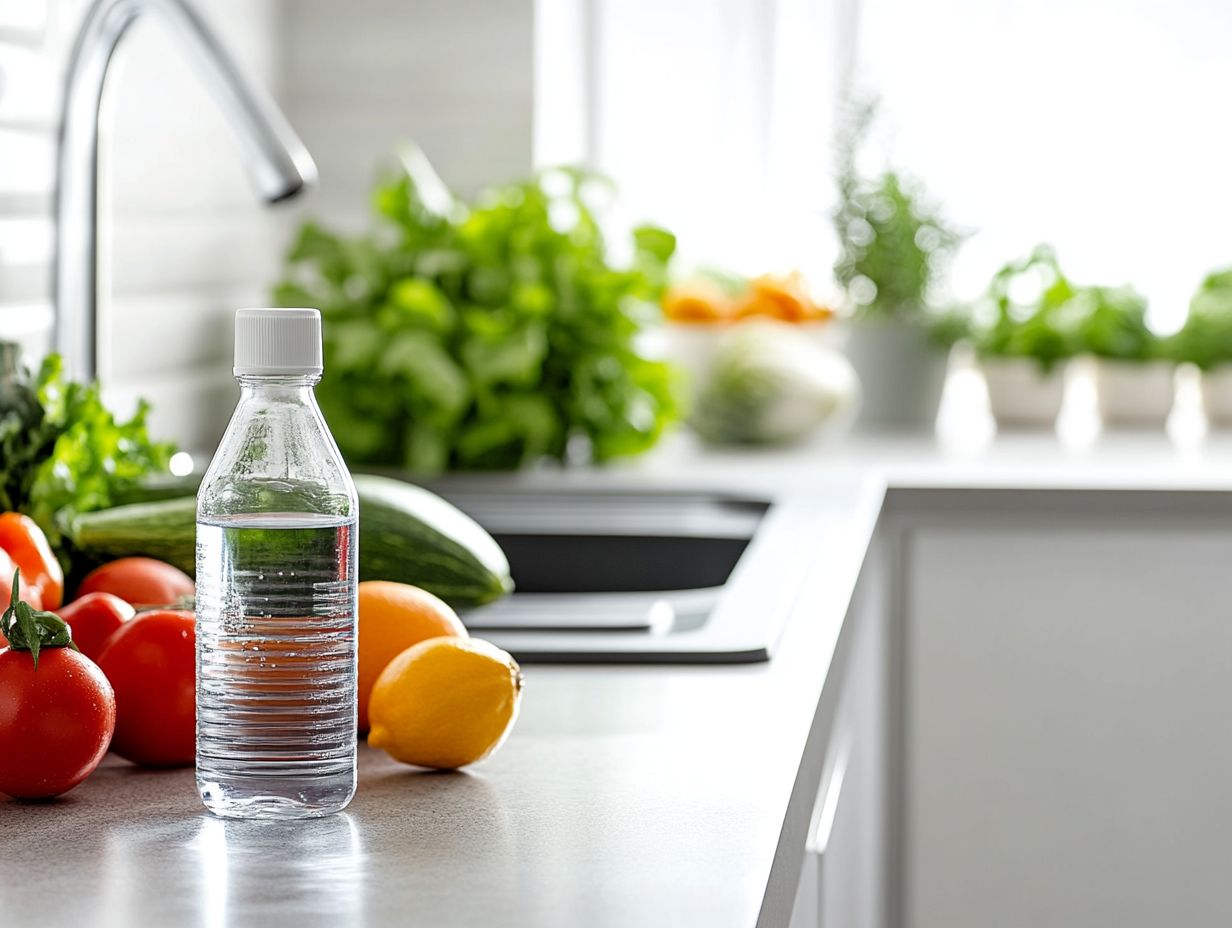
- Hydrogen peroxide is a versatile and commonly used chemical that has multiple benefits for daily use.
- It is a powerful disinfectant, promotes wound healing, and can be used for teeth whitening, clearing earwax buildup, and as a home remedy for treating foot fungus.
- When used safely and properly, it is non-toxic and environmentally friendly, making it a great alternative to harsher chemicals.
What is Hydrogen Peroxide?
Hydrogen peroxide, with the chemical formula H2O2, stands out as a remarkably versatile compound. You ll often find it employed for its potent disinfecting qualities, serving as a topical antiseptic for wound care.
Its distinctive chemical properties allow it to function as an effective antimicrobial agent, capable of killing harmful bacteria like E. coli and Salmonella. This makes it a must-have for both your home and medical kits!
Additionally, its safe concentration allows for various applications, spanning from dental care to gardening, highlighting its extensive utility in your daily life.
How is Hydrogen Peroxide Used?
Hydrogen peroxide is a remarkably versatile chemical compound that finds utility across a diverse range of fields, including cleaning, personal care, and medical applications. Its multifaceted nature as a cleaning solution and disinfectant truly sets it apart.
Whether you re disinfecting surfaces or treating minor infections, its potent antibacterial properties make it an essential choice for household cleaners and topical treatments alike. Moreover, you ll often discover it combined with other substances, such as baking soda, vinegar, and even essential oils to further amplify its effectiveness in various applications.
1. Cleaning and Disinfecting
Hydrogen peroxide serves as an exceptional cleaning solution. It effectively disinfects surfaces and is a top choice for households intent on eliminating harmful bacteria, mildew stains, and blood stains.
Its robust germ removal capabilities ensure that your environment remains cleaner and safer, whether you re sprucing up kitchen counters, bathroom surfaces, or cleaning tools like sponges and brushes, all contributing to an elevated level of household hygiene.
Don t miss out! Use a dilution ratio of one part hydrogen peroxide to ten parts water for amazing cleaning results. For those stubborn stains, such as mold or mildew, a 50/50 mixture may prove more effective. When addressing blood stains, applying hydrogen peroxide directly from the bottle can yield quick results, and employing a gentle dab and blot technique can further enhance its efficacy.
Many users remark that spraying it on bathroom fixtures not only disinfects but also leaves them sparkling. However, be cautious with colored fabrics, as hydrogen peroxide has the potential to cause discoloration.
Ultimately, integrating this versatile solution into your regular cleaning routine can lead to noticeable improvements in both sanitation and the appearance of your surfaces, making it a key component of home cleaning strategies.
2. Whitening Teeth
Hydrogen peroxide is a staple in dental hygiene products, renowned for its teeth whitening properties. When used as a mouth rinse at a safe concentration, it can effectively brighten your smile. Its remarkable ability to break down stains and combat odor-causing bacteria makes it a preferred choice for maintaining oral hygiene and achieving a whiter, healthier appearance.
It also helps treat canker sores, adding to its usefulness in dental care. You’ll find that many dental products offer varying concentrations of hydrogen peroxide, typically ranging from 3% in over-the-counter mouth rinses to higher percentages found in professional-grade whitening treatments. While home remedies incorporating this compound can also be effective, be careful! High concentrations can irritate your gums and damage your enamel.
Incorporating hydrogen peroxide into your regular oral care routine not only helps you achieve whiter teeth but also contributes to overall dental health by reducing harmful bacteria in your mouth. Understanding safe usage and potential side effects is essential for maximizing its benefits and ensuring a bright, luminous smile.
3. Treating Wounds and Infections
Using hydrogen peroxide as a disinfectant for treating wounds and infections is quite common, and for good reason it serves as an effective topical antiseptic. This powerful agent helps prevent infections caused by harmful bacteria and can also play a role in managing chronic inflammation, offering an alternative for those who prefer to steer clear of antibiotics in certain situations.
When you apply hydrogen peroxide to a wound, it releases oxygen, which aids in cleansing the area and removing debris, creating a cleaner environment conducive to the healing process. However, while it has its benefits, be careful! High concentrations can irritate your skin and potentially delay healing.
Alternatives like saline solutions or honey are gaining traction for their gentler properties and natural healing abilities. If you have a severe wound or if basic treatments aren’t working, seek professional help immediately for the best care.
4. Removing Earwax
Hydrogen peroxide serves as a safe and effective home remedy for removing earwax and preventing ear infections. Think of it as a gentle nasal spray for ear cleaning. Its bubbling action works wonders, dislodging wax buildup while providing a cleansing effect that contributes to your overall ear health.
To use hydrogen peroxide for earwax removal properly, it’s vital to dilute the solution to about 3% by mixing it with an equal part of water. This minimizes any potential irritation. When you re ready, lie on one side and apply a few drops into the ear to allow the solution to permeate the ear canal thoroughly.
After a few minutes, tilt your head to drain the liquid, which helps expel any dislodged wax and debris. Not only does this method encourage cleanliness, but it can also soothe any itchiness you may be experiencing. However, exercise caution if you have a history of ear problems, it s wise to consult a healthcare professional before trying this approach to ensure that it s safe and effective for you.
What are the Benefits of Using Hydrogen Peroxide?
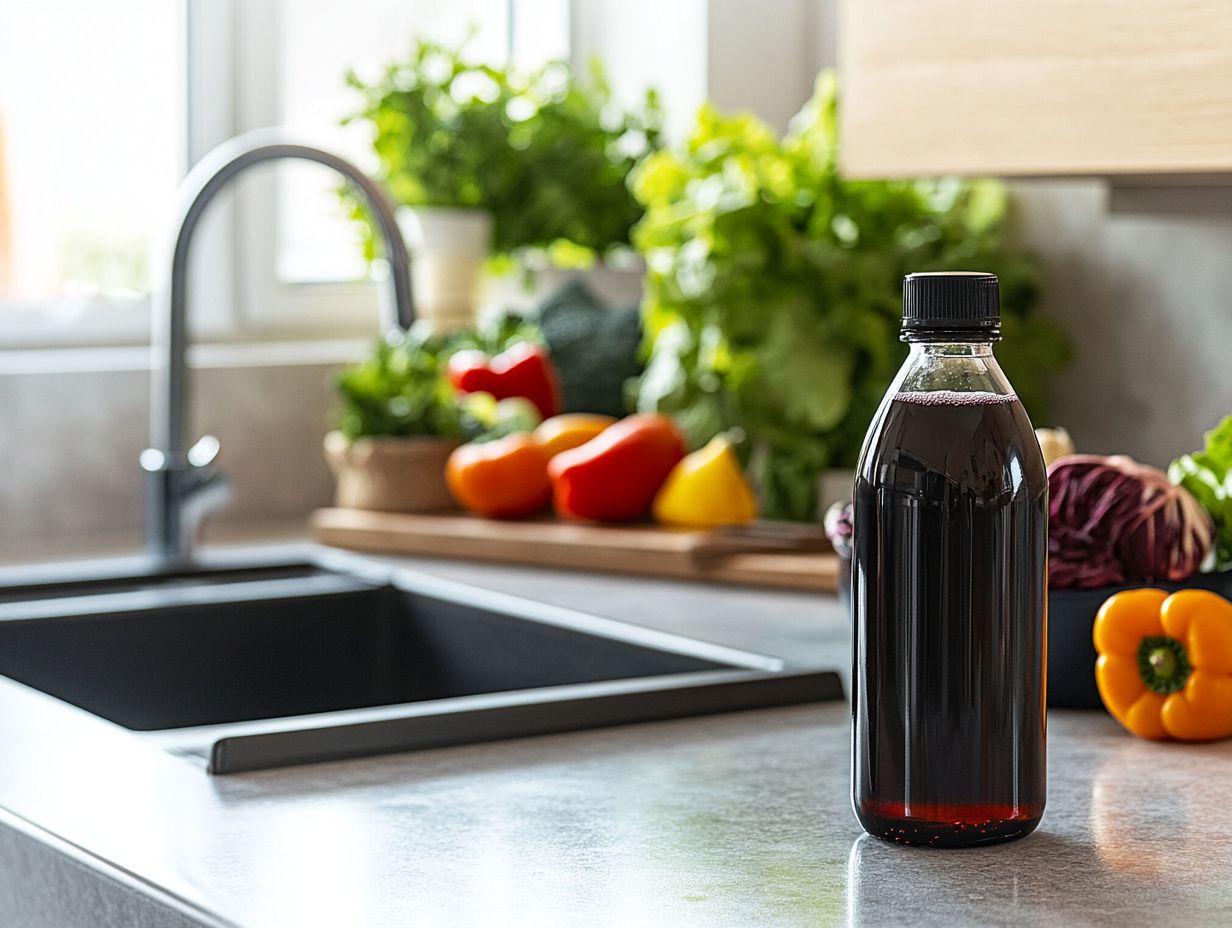
The advantages of using hydrogen peroxide go far beyond its well-known antibacterial qualities. It effectively eradicates bacteria and viruses, aids in wound healing, and serves as a non-toxic, environmentally friendly option for a range of cosmetic applications.
Its multifunctional nature makes it an invaluable addition to your personal care regimen, household cleaning strategies, and medical treatments alike, addressing various needs while prioritizing both safety and effectiveness.
1. Kills Bacteria and Viruses
As a powerful antimicrobial agent, hydrogen peroxide is known for its remarkable ability to kill bacteria and viruses, including notorious strains like E. coli and Salmonella. This makes it an excellent choice for disinfection, especially during the COVID-19 pandemic. Its effectiveness in germ elimination not only enhances sanitation standards but also plays a vital role in protecting public health. This unique chemical reaction ensures thorough disinfection.
In healthcare settings like hospitals and clinics, hydrogen peroxide is frequently used in various concentrations to sanitize surfaces and medical equipment. This practice significantly reduces the risk of hospital-acquired infections. A study published in the Journal of Hospital Infection found that a 3% hydrogen peroxide solution could lower surface bacteria by an impressive 99.9%. Using medical-grade hydrogen peroxide guarantees the highest efficacy for disinfection.
In homes, hydrogen peroxide is commonly found in disinfectant wipes and sprays. It is a key ingredient for combatting pathogens on kitchen counters and in bathrooms. According to the Centers for Disease Control and Prevention (CDC), using products containing hydrogen peroxide can significantly reduce viral contamination. This shows just how essential it is for keeping our homes healthy!
2. Promotes Wound Healing and Treats Skin Irritation
Hydrogen peroxide plays a vital role in promoting wound healing by disinfecting wounds and acting as an effective topical antiseptic (a substance that kills germs on the skin). It helps prevent infections and speeds up recovery times, making it a preferred option for many. Its ability to reduce chronic inflammation further enhances its effectiveness in the healing process.
This strong solution releases oxygen when it touches the skin, creating an environment that deters the growth of harmful bacteria and harmful pathogens. It also stimulates white blood cells, which are crucial in the body s natural healing process. Healthcare professionals often report that patients with surgical wounds show faster recovery when treated with hydrogen peroxide, significantly lowering infection rates.
Case studies indicate that individuals using hydrogen peroxide in their post-surgical care experienced less redness and swelling. This emphasizes its effectiveness in tissue regeneration and infection prevention. Additionally, hydrogen peroxide helps remove dead tissue, promoting more efficient healing.
3. Whitens Teeth
One remarkable advantage of hydrogen peroxide is its ability to whiten teeth. This is why it has become a staple in many dental hygiene products designed for oral care. When used as a mouth rinse, hydrogen peroxide can effectively diminish stains and brighten your teeth, as long as it s applied at a safe concentration.
You ll also find hydrogen peroxide in various over-the-counter whitening strips and gels that target stubborn discolorations. Dentists often recommend a diluted solution to minimize the risk of tooth sensitivity and gum irritation, ensuring a safe and pleasant experience. This diluted solution should be part of a good oral hygiene routine.
The power of hydrogen peroxide in breaking down stains is even more effective when combined with light-activated whitening systems used in professional treatments. Thinking about teeth whitening options? Here s what to know! Always follow safety guidelines such as not exceeding the recommended usage and consulting a dental professional for personalized advice to achieve your desired results while keeping your oral health safe. These practices ensure that hydrogen peroxide is a reliable option for teeth whitening.
4. Clears Earwax Buildup
Hydrogen peroxide is a good solution for clearing earwax buildup. It acts as a reliable home remedy that helps prevent ear infections. Its gentle action makes it a preferred choice for people looking for safe and effective ear cleaning methods. It also helps reduce the risk of other ear infections.
To use hydrogen peroxide for earwax removal, mix equal parts of 3% hydrogen peroxide and water. Place the solution in a dropper and administer a few drops into your ear canal while tilting your head to allow for proper drainage. As the solution bubbles, it works to soften and dislodge the wax buildup. This method is also useful for general ear hygiene. Use this method wisely to keep your ears healthy and irritation-free!
Before starting this procedure, consult with a healthcare professional, especially if you have any existing ear conditions. This ensures that this approach is suitable for your specific situation.
5. Non-toxic and Environmentally Friendly
Hydrogen peroxide is a non-toxic and environmentally friendly alternative to many household cleaners and personal care products. This makes it an excellent choice for anyone concerned about chemical exposure. Its versatility extends to a variety of cosmetic uses, highlighting its compatibility with sustainable practices.
By choosing hydrogen peroxide over conventional cleaning agents filled with harsh chemicals, you reduce health risks and lessen your environmental footprint. It effectively breaks down organic materials and eliminates bacteria without leaving toxic residues, making it a great eco-friendly cleaning solution.
In cosmetics, hydrogen peroxide offers natural whitening and antiseptic benefits, paving the way for safer skincare routines. This eco-friendly option aligns perfectly with the growing trend toward sustainable living, allowing you to contribute to a healthier planet. It also performs well in stain removal, including mildew and blood stains.
Are There Any Side Effects of Using Hydrogen Peroxide?
While hydrogen peroxide has many benefits, be mindful of potential side effects, such as skin irritation, stomach discomfort, and allergic reactions. These can occur from improper use or excessive concentrations. Using hydrogen peroxide improperly can lead to problems.
Familiarizing yourself with safety precautions is essential for its safe application in personal care and cleaning. Using hydrogen peroxide correctly can mitigate many of these risks.
1. Skin Irritation
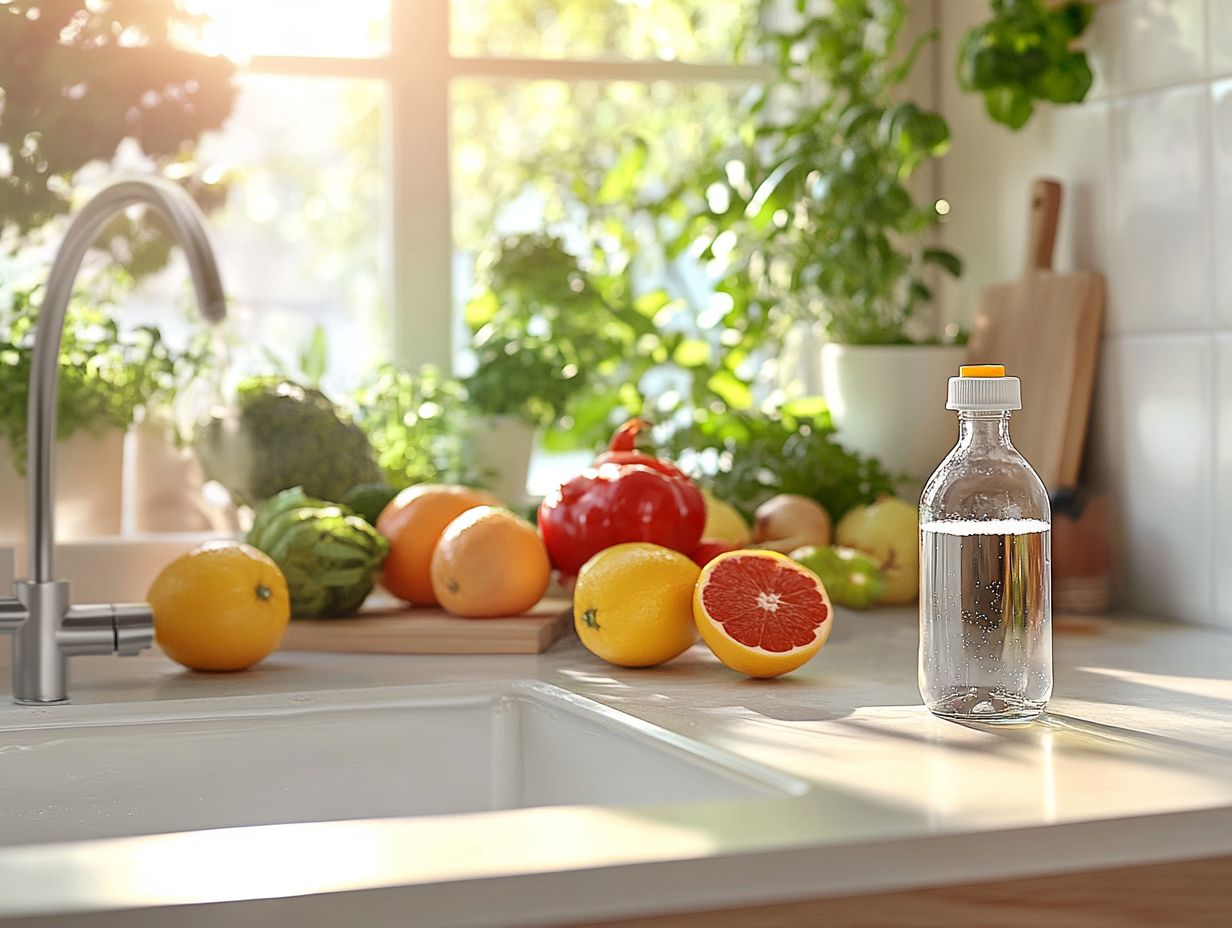
Skin irritation can occur when using hydrogen peroxide, especially at higher concentrations or without proper dilution. If you have sensitive skin, you might notice redness or discomfort. This underscores the importance of following safe concentration guidelines, particularly when using topical treatments.
Besides high concentrations, other factors like prolonged exposure and individual skin sensitivities can worsen these irritations. Symptoms may include burning, stinging, and in some cases, peeling or blistering of the affected areas. Consult healthcare professionals if symptoms persist.
When using hydrogen peroxide for wound care or household cleaning, start with lower concentrations and conduct a patch test to assess your tolerance. If irritation occurs, rinsing the area with cool water can provide immediate relief. Following up with a gentle moisturizer can help soothe and protect your skin barrier. Adding essential oils to your post-treatment routine may also aid in reducing irritation.
If you face severe reactions, seek medical attention immediately. If you experience respiratory issues or severe skin reactions, prompt medical intervention is crucial.
2. Stomach Irritation
Ingesting hydrogen peroxide can lead to stomach irritation. It’s crucial to adhere to safety precautions and avoid internal use unless a medical professional has explicitly advised it. Understanding the risks tied to improper ingestion is essential for preventing any adverse reactions. This includes risks associated with using it as a nasal spray or for other internal purposes.
When hydrogen peroxide makes its way into the gastrointestinal tract, it can trigger symptoms like nausea, vomiting, and abdominal pain due to its reactive properties. If you’re considering using it for various health purposes, be cautious. It could also lead to respiratory illnesses if inhaled in high concentrations.
Recognizing safe usage guidelines is imperative. This includes the importance of diluting the solution and consulting with healthcare providers before any application. Be aware of the appropriate concentration levels, as commercial products can vary significantly. Always use medical-grade hydrogen peroxide for health-related applications.
Prioritizing safety is key to mitigating potential health risks associated with both accidental and intentional ingestion.
3. Allergic Reactions
Allergic reactions to hydrogen peroxide, while uncommon, can manifest in individuals with sensitive skin. You might experience symptoms such as rashes, itching, or, in more severe cases, even breathing difficulties. It’s crucial to take safety precautions and perform a patch test before extensive use, especially if you re prone to allergies. For those with canker sores, a diluted hydrogen peroxide solution can sometimes help, but approach it cautiously.
As you apply hydrogen peroxide, keep a close eye for any adverse reactions. Symptoms can vary significantly from person to person. Experts suggest diluting the solution to reduce the risk of irritation and recommend avoiding direct contact with the skin when possible, particularly if you have a history of skin sensitivities.
In cases of severe reactions, discontinue use immediately and consider alternative antiseptics. If an allergic reaction occurs, stop using the product and consult a healthcare professional. Explore alternative antiseptics that might be gentler on your skin to ensure that your skin health remains a top priority in your personal care routine.
How to Use Hydrogen Peroxide Safely?
Using hydrogen peroxide safely requires taking several essential precautions. Start by properly diluting the compound to the appropriate concentration. It’s also crucial to protect your skin and eyes from any direct contact to avoid irritation.
Remember, never ingest the solution under any circumstances. Follow these safety measures to enjoy the amazing benefits of hydrogen peroxide without risk!
1. Dilute Properly
Diluting hydrogen peroxide properly is crucial for achieving a safe concentration tailored to your intended use, whether for cleaning purposes or treating wounds. By adhering to the recommended dilution ratios, which means the amount of water you mix with hydrogen peroxide, you can maximize its effectiveness while minimizing the risk of irritation or adverse reactions.
It’s beneficial in various home cleaning applications, from kitchen cleaning to disinfecting surfaces. For general household cleaning, a 3% hydrogen peroxide solution is typically sufficient. However, for stubborn stains or disinfecting surfaces, you might opt for a more potent solution of up to 10%. This concentration can be particularly effective in laundry applications, such as removing mildew and blood stains.
For personal care, especially wound cleaning, it’s best to stick with a diluted concentration of around 1%. This helps avoid potential cellular damage while still harnessing its germ-killing properties. You can also use a diluted solution for foot soaks to treat foot fungus.
Carefully measure and mix hydrogen peroxide with water. Always ensure you re working in a well-ventilated area and wearing appropriate protective gear, especially when handling higher concentrations. Understanding its chemical properties is crucial for your safety and effectiveness.
2. Protect Skin and Eyes
Protecting your skin and eyes when using hydrogen peroxide is crucial. Direct contact can lead to skin irritation, long-term swelling, or even allergic reactions. Put on protective gear like gloves and goggles to ensure your safety!
Work in a well-ventilated area to avoid inhaling fumes that could cause respiratory irritation or illnesses. If you’re in a space that isn’t well-ventilated, wearing a mask can further enhance your safety.
Be mindful of the concentration of hydrogen peroxide you re using, as higher concentrations elevate the potential for harm. Store hydrogen peroxide in a cool, dark place, safely out of reach of children and pets.
Before handling this chemical, review the safety data sheet (SDS). It provides crucial information about hazards and emergency protocols, keeping you informed and prepared.
3. Do Not Ingest
Never ingest hydrogen peroxide under any circumstances. Doing so can lead to significant stomach irritation and other harmful effects. Being aware of this guideline is critical for safe handling, especially in households with children or pets.
Even small amounts can trigger nausea, vomiting, and abdominal pain. These symptoms can escalate into more severe complications, such as inflammation or perforation of the gastrointestinal tract. The risks increase with solutions higher than 3%, typically reserved for industrial applications.
If accidental ingestion occurs, seek immediate medical attention. Doctors may suggest making you vomit to reduce the harmful effects, depending on the severity of the situation.
To prevent any unintentional exposure, always keep hydrogen peroxide securely out of reach.
Frequently Asked Questions
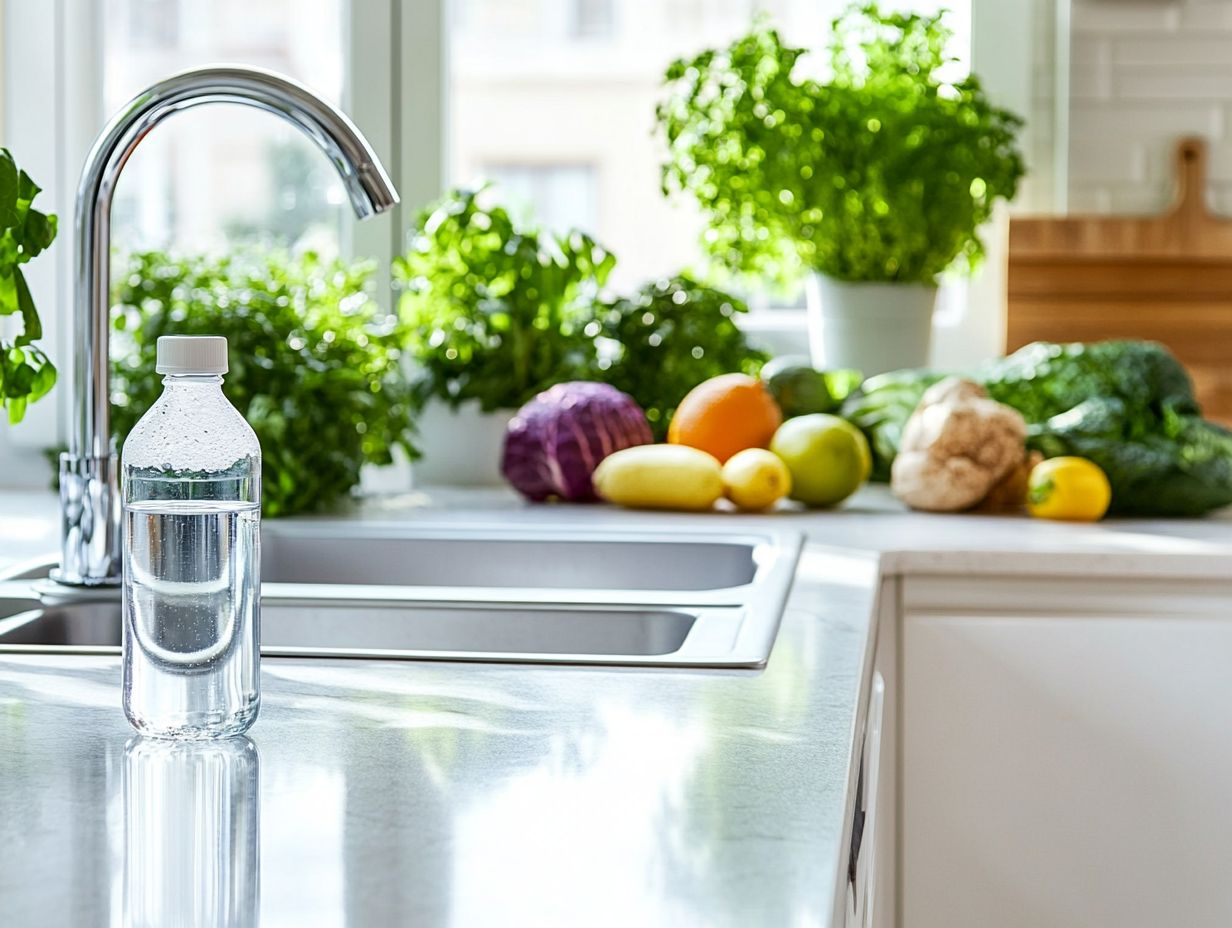
What are the benefits of using hydrogen peroxide for cleaning?
Hydrogen peroxide is a powerful cleaning agent that is non-toxic, biodegradable, and effective at removing stains and disinfecting surfaces. It can also be used as a cleaning solution for kitchen cleaning and disinfecting surfaces around the house.
How can using hydrogen peroxide improve oral health?
Hydrogen peroxide is a common ingredient in mouth rinse and toothpaste due to its ability to kill bacteria and reduce plaque. This leads to better oral hygiene and overall dental health.
Can hydrogen peroxide be used as a natural alternative to bleach?
Yes, hydrogen peroxide can serve as a natural bleach substitute. It effectively removes stains and brightens whites without harsh chemicals found in traditional bleach products. Its bleaching effect is especially useful in household cleaners for stain removal and disinfecting surfaces.
What are the benefits of using hydrogen peroxide for wound care?
Hydrogen peroxide has antiseptic and antibacterial properties, making it useful for cleaning and disinfecting wounds to prevent infection and promote healing. It is often used as a topical antiseptic in personal care and topical treatment routines.
Is hydrogen peroxide safe for the environment?
Yes, hydrogen peroxide breaks down into water and oxygen, making it safe for the environment and a more eco-friendly cleaning option compared to harsh chemicals. Its use in gardening tools and plant disease treatment is also considered safe for the environment.
How does using hydrogen peroxide benefit hair and skin health?
Hydrogen peroxide can lighten hair and fade dark spots on skin. It can also treat conditions like dandruff, acne, and foot fungus. However, it should always be used in moderation and diluted properly. Its cosmetic uses are vast but should adhere to safety precautions.

